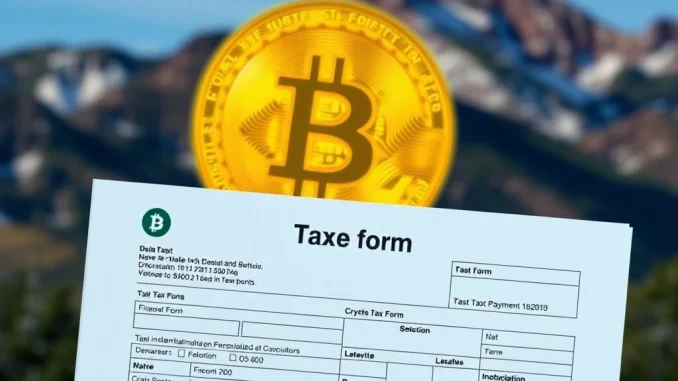
Colorado made headlines in 2022 by becoming one of the first U.S. states to embrace the future of finance and allow crypto tax payments. It sounded like a revolutionary step, paving the way for wider crypto adoption and demonstrating the state’s progressive stance. But fast forward two years, and the reality is… well, let’s just say it’s far from the crypto utopia many envisioned. The numbers are in, and they paint a clear picture: Colorado’s foray into cryptocurrency tax payments is experiencing a surprisingly slow start.
Colorado’s Crypto Tax Experiment: A Deep Dive into the Data
Let’s break down the numbers because they tell a compelling, albeit underwhelming, story. Since September 2022, when Colorado officially opened its doors to tax payments in digital currencies, the state has collected a staggering $11 billion in income tax. Out of this massive sum, how much do you think was paid using cryptocurrencies? Brace yourselves… a mere $57,000. Yes, you read that right. That’s a minuscule 0.0005% of the total income tax collected. To put it in perspective, it’s like finding a single grain of sand on a vast beach.
Here’s a year-by-year breakdown to illustrate the trend:
| Year | Cases | Amount Paid in Crypto |
|---|---|---|
| 2022 (from September) | 8 | $16,426 |
| 2023 | 22 | $23,241 |
| 2024 | 48 | $17,544 |
As you can see, while the number of cases has increased over time, the total amount paid in crypto actually decreased in 2024 compared to the previous year. This raises some crucial questions. Why is the uptake so low? Is there a lack of awareness? Are there inherent challenges in using crypto for tax payments?
Unpacking the Reasons Behind the Slow Crypto Adoption for Tax Payments in Colorado
Several factors could be contributing to the sluggish adoption of crypto tax payments in Colorado. Let’s explore some potential reasons:
- Volatility Concerns: Cryptocurrency prices are known for their volatility. Taxpayers might be hesitant to use crypto for payments, fearing price fluctuations between the time of payment and when the state processes it. No one wants to pay more in taxes due to a sudden crypto price surge!
- Complexity and Convenience: For many, the traditional system of paying taxes via bank transfers, checks, or credit cards is straightforward and convenient. Navigating crypto wallets, exchanges, and understanding transaction fees might seem like an unnecessary hurdle for tax payments.
- Tax Implications of Crypto Transactions: Using crypto for payments, even for taxes, can trigger taxable events. Taxpayers might be wary of the added complexity of calculating capital gains or losses associated with using their crypto holdings for tax payments.
- Limited Awareness: Despite the initial buzz, there might be a lack of widespread awareness among Colorado taxpayers that this payment option even exists. Effective communication and outreach are crucial to boost adoption.
- Transaction Fees: While crypto transactions can sometimes be cheaper, they can also incur fees, especially depending on the network and exchange used. These fees, although potentially small, might deter some taxpayers when compared to fee-free traditional payment methods.
- Preference for Holding Crypto: Many crypto holders view their digital assets as long-term investments. They might prefer to hold onto their crypto rather than spend it, especially for payments like taxes, opting instead for fiat currency.
The Potential Benefits of Crypto Tax Payments: Why Should Colorado Persist?
Despite the current low uptake, offering crypto tax payments still holds significant potential benefits for Colorado and its residents in the long run:
- Innovation and Modernization: Embracing crypto payments positions Colorado as a forward-thinking and innovative state, attracting tech-savvy individuals and businesses.
- Reduced Transaction Costs for the State (Potentially): In the long term, if adoption increases, processing crypto payments could potentially reduce transaction costs for the state compared to traditional banking systems.
- Increased Financial Inclusion: Cryptocurrency can offer access to financial services for individuals who are unbanked or underbanked. Allowing crypto tax payments could be a step towards greater financial inclusion.
- Diversification of Payment Options: Providing diverse payment options caters to a wider range of preferences and technological adoption levels among taxpayers.
- Future-Proofing the Tax System: As digital currencies become increasingly integrated into the global economy, having a system in place to handle crypto payments is a proactive step towards future-proofing the state’s tax infrastructure.
Actionable Insights: How Can Colorado Boost Crypto Tax Payment Adoption?
To move the needle and encourage greater adoption of crypto tax payments in Colorado, here are some actionable insights:
- Public Awareness Campaigns: Launch targeted campaigns to educate taxpayers about the option to pay taxes with crypto, highlighting the benefits and addressing common concerns.
- Simplify the Payment Process: Work towards streamlining the crypto payment process, making it as user-friendly and intuitive as possible. Clear, step-by-step guides and readily available support can make a big difference.
- Address Volatility Concerns: Explore mechanisms to mitigate taxpayer concerns about crypto volatility during the payment process. This could involve partnerships with stablecoin platforms or offering real-time conversion rates.
- Incentivize Crypto Payments (Carefully): Consider exploring (with caution and proper legal review) small incentives for using crypto for tax payments, such as minor discounts or faster processing, to encourage initial adoption.
- Gather Feedback and Iterate: Continuously monitor the crypto tax payment system, gather feedback from users and stakeholders, and iterate on the process to address pain points and improve the overall experience.
- Collaborate with Crypto Industry: Partner with cryptocurrency exchanges and service providers to promote the tax payment option and offer educational resources to users.
The Future of Crypto Tax Payments: A Long Game
While the initial uptake of crypto tax payments in Colorado has been modest, it’s crucial to remember that this is likely a long game. Crypto adoption, in general, is still in its early stages, and changing established financial behaviors takes time. Colorado’s initiative is a pioneering step, and with consistent effort, education, and refinement of the system, the state can pave the way for wider acceptance of digital currencies in government services. The potential is there; it just needs nurturing and strategic implementation to truly flourish. The journey of integrating crypto into traditional systems like tax payments is just beginning, and Colorado is at the forefront, learning valuable lessons and setting the stage for what could be a significant shift in how we interact with finance and government in the digital age.



